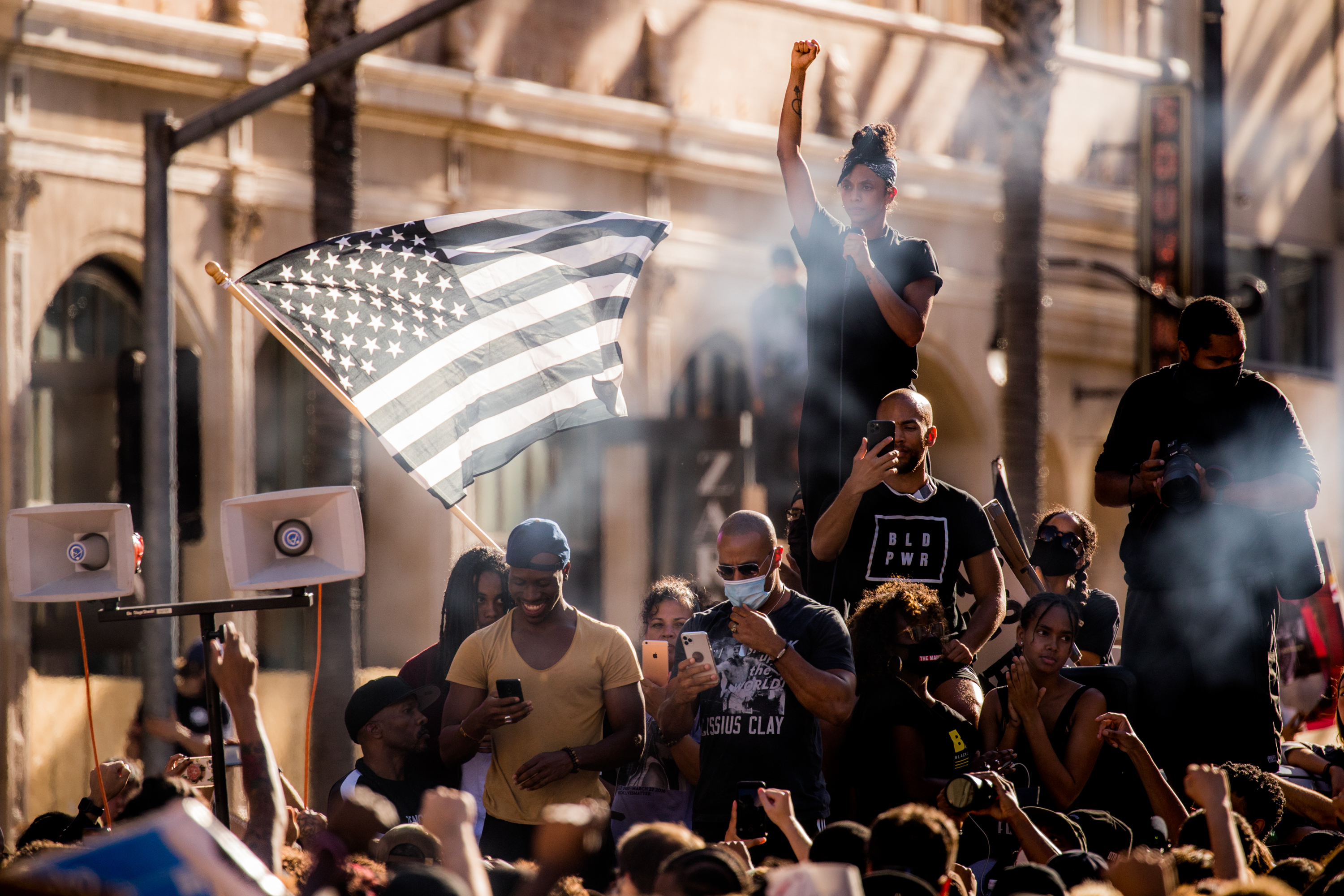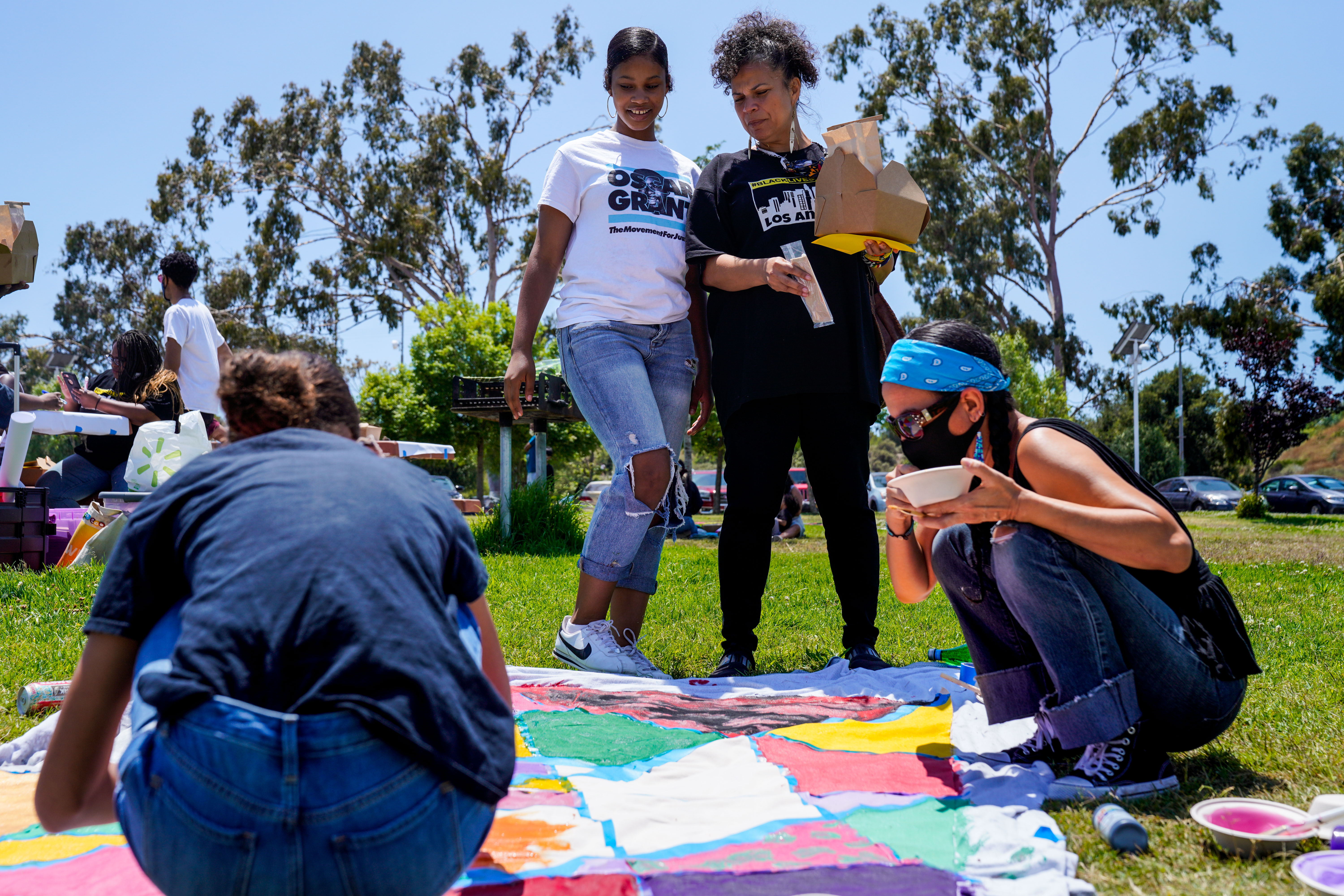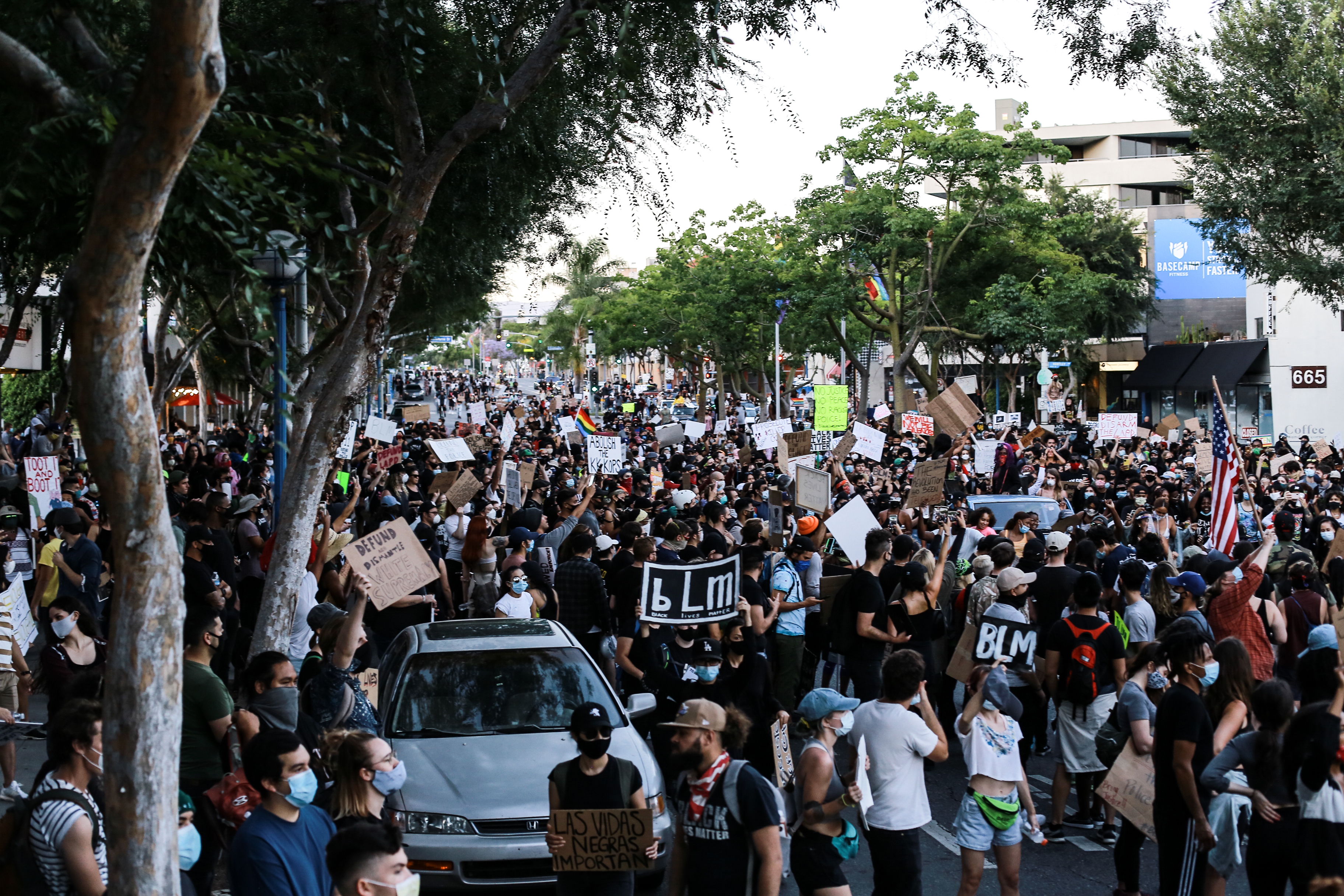On May 25th, police officers in Minneapolis arrested 46-year-old George Floyd after a convenience store employee alerted 911 that he may have paid with a counterfeit $20 bill. Once apprehended by the police, officer Derek Chauvin pinned Floyd to the ground, driving his knee into Floyd’s neck for eight minutes and 46 seconds, despite onlookers calling for him to stop and Floyd’s own desperate pleas for help. Video of the killing sparked protests in all 50 states and around the world –resulting in significant actions being taken across all quadrants of our society. Laws are being changed, police departments have been defunded, and statues of colonizers and slave traders have fallen.
Melina Abdullah, an activist, professor, and co-founder of Black Lives Matter’s (BLM) LA chapter, knows that if we really want to change the world, the protests must also give rise to calculated political action.
“Make sure you research who your DA is and whether or not you want to keep them,” Abdullah urges, after weeks of leading demonstrations across Los Angeles (including outside the home of Mayor Eric Garcetti). “The district attorney is an elected official who prosecutes crimes, so we want to make sure that as they’re prosecuting, the first people who go to jail for committing crimes are the police who brutalize and kill our people.”
Abdullah and Black Lives Matter LA have been at the forefront of the protests in Los Angeles, helping the city demand accountability from its police department and elected officials like never before. Since taking to the streets, Angelenos have prompted Garcetti to reexamine a budget that would allocate 54% of the city’s funds to law enforcement agencies and promise a $250 million cut from the LAPD, with money redirected towards health and education in black communities. The mayor has also floated the idea of implementing an independent prosecutor to oversee police violations.
Anger at an unjust system is easy to muster, but turning that rage into a tool to bring about meaningful and systemic change is crucial. Many of us who have taken to the streets don’t know what to do after we’ve made signs, marched, signed the petitions, and donated our money to organizations like BLM. So we reached out to Abdullah to talk about the next steps, defunding the police, and why we need to vote in this upcoming election, even if we’ve lost faith in our government.

I wanted to talk to you a little bit about defunding the police. On the surface that might sound a little bit extreme to some. For the people who wonder who will keep the law if we massively scale back police funds, what would you say to those concerns?
I think that defunding the police sounds radical until we realize that there wasn’t always policing and there wasn’t always this kind of expansionist approach to policing. So when we say “defund the police,” we mean defund the police. Here is something else that should be equally shocking, if not more. In the city of Los Angeles, the mayor was proposing to spend 54% of the city’s budget on the LAPD. That is an astronomical amount, especially when you consider that we’re in a health pandemic with an economic fallout and that policing doesn’t answer a healthcare crisis or an economic crisis.
LAPD was the only city department that Mayor Garcetti proposed an increase for, as he’s slashing other city departments and furloughing 16,000 city employees in the midst of this economic crisis. Some will say that defunding the police sounds radical but I think that they should also look at how radical it is or how shocking it is to be spending so much money on police.
Finally, everybody says things are “crazy” or “radical” or “impossible” until they’re done. The city of Minneapolis just committed itself to disbanding their police department, so I think that shows us that it is possible. If people look at PeoplesBudgetLA.com, they’ll see that when we engaged in a participatory budgeting session with Angelenos, they wanted to spend 5.7% of the city’s budget on traditional approaches to law enforcement. That includes the LAPD, that includes traffic enforcement and includes the city attorney’s office, which is the prosecutor for the city. People don’t want to spend this kind of money on police. When we look at those survey results, people saw this kind of approach to law enforcement as the “least important” of their spending priorities.
Saying “defund the police” really just moves us towards what most people say they want anyway.
You’ve been center stage in the effort to prevent Mayor Garcetti from passing his city budget and even with the $150 million cut that still leaves over $3 billion for law enforcement, before the cut that was 54% of the city’s budget. In your view, what is a better way of using that money and what kind of community organizations and things should we do with that money instead?
I think everybody wants to live in a safe, healthy, and vibrant community. When we think about how to get there, we know that the first thing we need to do is meet the universal needs of people, make sure that everybody has housing, make sure that everybody has healthcare, make sure that everybody has access to healthy food, make sure that we have parks and libraries and after school programs. I think you make a safe environment by providing first for the needs of people.
Angelenos don’t like being home to the largest houseless population in the nation. We have 60,000 unhoused people in this county, and it’s absolutely ridiculous. If you look at a budget you’ll see people’s priorities. So what this budget tells us is that the priority for this mayor is clearly investing — or spending, I won’t even call it an investment — spending on policing, which really functions to repress, and oppress, and surveil, and brutalize and even kill our community members rather than doing what the people say that we need, which is spending on things like housing.
Aside from abolishing or defunding the police, there is also real reform that we can get done now, without waiting for the cogs of bureaucracy to turn, or election cycles to come around. What are some of those things that we can demand now?
There are spaces for abolition and I think that most people are with us on this one: police don’t belong in schools. Period. Right now., the LAUSD schools have police armed with AR15 weapons. The first thing that we can do to end policing or to defund police is to remove them from schools. We’re working with our partners from StudentsDeserve, we’re working with the teacher’s union UTLA, to immediately remove police from schools. We talk about bureaucracy, but these are things that can happen overnight, all it takes is a decision to end the funding of LA School Police, which is the largest school police system in the country.
We can also have Recs and Parks sever their relationship with the LAPD, this is happening around the country. People are recognizing that police have no business in the parks, we need youth workers in the parks, so lets severe those ties — that’s only the stroke of a pen by the head of the department.
The LA police union has said that the reason they’re taking up more of the budget is because they’re doing jobs of social workers, drug rehabilitation counselors, and EMTs. What we’re saying is they have no business or expertise in doing those jobs, so let’s give them a break. You shouldn’t be doing those jobs, let’s move that money to hire real social workers, real drug rehabilitation counselors, and real EMTs.
Sometimes we talk about bureaucracy and we know that white supremacist capitalism sets up systems to make it seem difficult to do the things that need to be done, but the city council can change the budget at any time. It doesn’t take long, all it takes is eight votes of the city council, which is what they did in Minneapolis. All they did was vote for it — all we need our city council to do is have the will to overturn the mayor’s budget. It can be done, it doesn’t have to take some long, drawn-out process.
Right now, there is a real possibility that we’re going to have to take to the streets en masse, multiple times, if we want things to get done and really want them to change. How are protests organized, and how are actions planned?
We spend a whole lot of time strategizing as a team in BLM and among our ally groups. We have a commitment to group-centered leadership, which is the recognition that no one person should be in charge of the movement, it should be a collective of people.
This last week we’ve had an action every day. Some things are highly visible like Sunday’s march in Hollywood, where we had more than 100,000 people in the streets, but then there are some things that we don’t put in the media because it’s not meant for everybody. We had a black community meeting that was invitation-only, not to be exclusive but to say that we knew the church basement we were meeting in couldn’t accommodate tens of thousands of people so we sent out personal invites to folks and had a couple of hundred people talk about what it means to defund the police, and getting into conversations about revolutionary radical visions, and how do we get some justice right now, today.
We strategize and we talk and figure out how to balance — our strategy is always to disrupt white supremacy and build black community, so how do we strike that balance? It takes a community of people who are committed to doing the work, to figuring out that balance and planning out the next move.

Right now there is a lot of passion amongst people who want to help, aside from protesting, donating, and signing petitions — especially for those who are immunocompromised — how else can a person help end police violence?
There is a whole lot people can do. A lot of our actions are still online, recognizing that there are still people who are immunocompromised. So today, from 1-2 pm, we have a Twitter storm, we’re asking everybody to call in to the budget committee, we’re asking people to send emails to the LA city budget committee, we’re also continuing our work in places like Torrance, where Christopher Deandre Mitchell was killed by two Torrance police officers, Anthony Chavez and Matthew Concannon. He was killed in a span of 15 seconds of their approach to the car. They still haven’t been fired.
Every Tuesday night, we put pressure on the Torrance city council to both fire those officers and also establish a police oversight commission. People who are immunocompromised can engage in actions like that.
There are three things everyone can offer: your voice, your body, and your resources. If your body is not available then please share your voice and your resources. Amplify what we’re saying, even if it’s as simple as tweeting out or posting on your page “Defund the police,” even if its something as simple as explaining to your family what defunding the police means. One of the greatest resources we received recently was a $500 Uber Eats gift card. The reason that’s great is because we have meetings, and we need food at those meetings. If you have gift cards you aren’t using, please give them to us, we’ll make use of them, there is a need for sound systems. You can donate things like that. Let me just say: whatever it is you have, bring it to the movement. Anything, whatever it is.
We recently got into a relationship with the singer Amber Riley. She has one of the most magnificent voices I’ve ever heard in my life, what she does now is show up at the actions and sing, and it brings life into those actions. You might not be able to get out and do it, but whatever it is you have, please contribute it.
When someone is donating to BLM or one of their local BLM chapters, where does that money go and how is it being used?
Black Lives Matter is not a traditional non-profit organization. Nobody works for Black Lives Matter or gets a check from Black Lives Matter. We’re not employees. When you donate money, we use that money for a range of things including organizing work. We use it to pay for flyers, we use it to pay for sound systems, we use it to amplify posts, we use it to support families.
When people are killed by police they’re not considered crime victims, so money that would normally go to victims of violent crime don’t go to those folks, so we help to pay for both funerals and independent autopsies, which are hugely important because, as we’ve seen with the murder of George Floyd, sometimes the coroners are in bed with these law enforcement agencies and their reports don’t reflect what actually happened.
We have some medical examiners who volunteer their time with us, but we still have to pay for their expenses, the storage of the body, etcetera. The donations make sure families can get independent autopsies which generally cost about six to seven thousand dollars per person on the low end.
We’re in the midst of an economic fallout from a health pandemic, so we also do a lot of mutual aide work. When people can’t pay for their groceries or need help paying their utilities or other bills we try to contribute to that. There is virtually no administrative overhead, so the space in which we meet, the space in which we store things, those are all donated. We don’t pay for anything but utilities, phones, and the internet in those spaces, so your donations go directly into the streets.

What’s something every protestor should know before hitting the streets?
We always try to have legal observers there, and we always try to have street medics there, but safety is a huge issue. You don’t have to worry so much about the protestors, but the police violence we’ve seen with this round of protests has been particularly brutal. We say that especially if you’re coming out with kids — and I’m a single mom so I always come out with my children — that you make sure you have an exit plan. That you make sure someone knows what to do if you get separated from your children. If you’re on parole or probation or if you have warrants, you want to make sure you think it through around whether or not you want to do certain things, we definitely don’t want you out on the frontline next to the police.
We also make sure people write down the number of the National Lawyers Guild on their arm so that if you are arrested we can help provide you with some legal support so we can make sure you’re released.
Then I also think it’s just a good call, in general, to engage in the safe practice of letting someone always know where you are and what your emergency plan is. Always have. an energy plan and don’t come to protests alone, find at least one other person to go with you.
A lot of people right now are frustrated by the process of reform and voting and getting things done through official channels. Do you have a message for first-time voters, and those who feel disenfranchised by the systems we have in place?
I think you should vote because even if you’re not going to vote for the President — which I think you should — but even if that doesn’t move you, we need to get this district attorney out of office. We need to get Jackie Lacey out of office. If you don’t vote for anything else, go to the polls and vote in the DA race and make sure you don’t vote for Jackie Lacey. If you live in other cities or other counties, make sure you research who your DA is and whether or not you want to keep them. The district attorney is an elected official who prosecutes crimes, so we want to make sure that as that they are prosecuting, the first people who go to jail for committing crimes are the police who brutalize and kill our people.
For protestors, what is the next step and how do we keep up this historic and unprecedented momentum?
Don’t go in the house. Don’t let them lure you with crumbs and tell you now its time to go home. We need to stay in these streets and we also need to organize. It’s really important to plug into organizations. If you’re black and want to join Black Lives Matter, we welcome you. If you’re white and you want to support Black Lives Matter, we’re asking you to join White People for Black Lives, and there is lots of other organizations Centro CSO, American Indian Movement — find an organization that speaks to you and join that organization.
Transformative change does not happen just one person at a time, being plugged into an organization increases our power exponentially.

